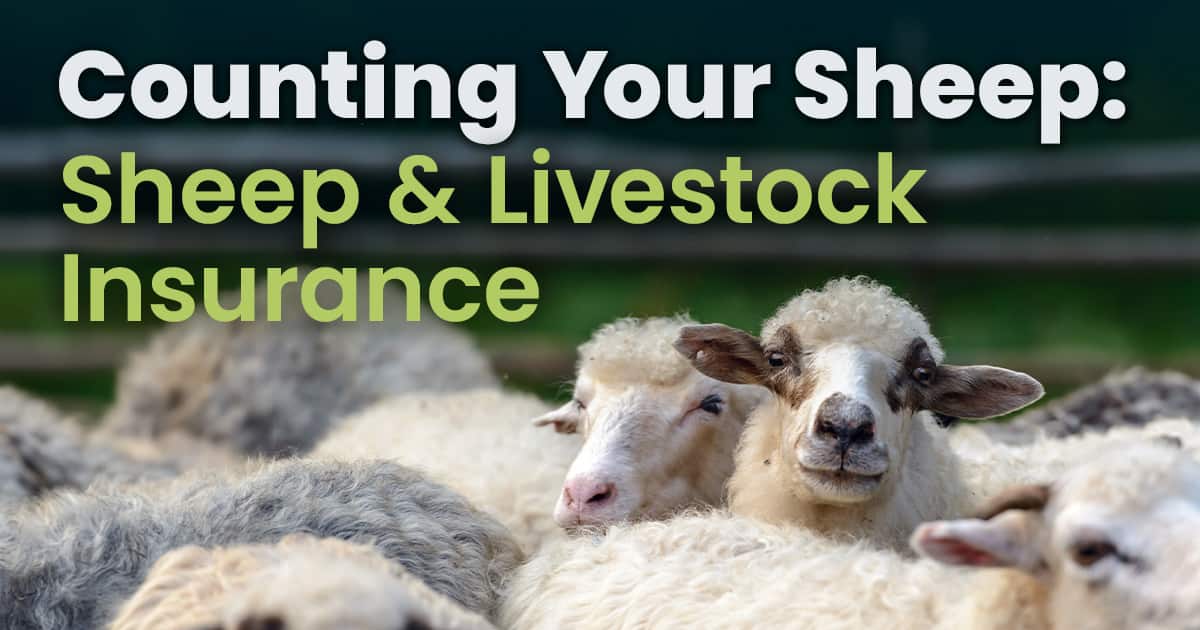
Counting Your Sheep: Sheep & Livestock Insurance
November 15, 2024
Share:
One sheep, two sheep, red sheep, blue sheep. While we sincerely hope none of the sheep on your farm are red or blue, keeping track of your assets is part of a critical risk management strategy that can ensure your agriculture operations are up and running as they should. But that goes beyond simply counting your flock.
Livestock and sheep farm insurance are both critical components of any sheep farmer’s business operations, as they stand to protect your business against potential losses and reduce your odds of going bankrupt if something disastrous, such as a tornado, were to devastate your farm. These are types of business insurance designed to help farmers specifically.
So read on and take a glimpse at some of the critical reasons why you might need sheep farm insurance, some risk management tips to keep in mind as a sheep farmer, and some resources to help keep your animals – and your livelihood – even safer.
The Presence of Sheep Farmers in Ontario & Resources
Can you believe that, according to 2021 Statistics Canada Census of Agriculture study, there were over 1,309 sheep and goat farms in Ontario? That represents nearly 40% of all that sector within Canada. For thousands of years, sheep have been depended upon as both a source of food and a source of material, as their wool is harvested to spin into clothing or various products. As you might imagine, sheep production is plentiful in Ontario. For many farmers, sheep production tends to be a secondary or even a tertiary enterprise, but for some farmers it’s their core lifeblood!
While Excalibur Insurance is, of course, always here to protect you and your livestock, we also advise you to take advantage of the resources at your disposal. Check out OntarioSheep.org’s risk management program for sheep farmers in Ontario. This program helps Ontario farmers offset losses due to rising production costs and low commodity prices and ensures that – in addition to comprehensive insurance – your odds of losing a sheep are low to none!
Your Standard Sheep Farm Insurance, Boiled Down
A standard sheep farm insurance policy encapsulates all of the various equipment, property, employees, materials, and space you would need to raise and nurture sheep – and that’s not even considering livestock insurance, a separate insurance plan designed to insure your animals.
Unlike horses, sheep are usually kept on the owner’s farm. (With horses, insurance gets complicated when you need to insure a horse living at someone else’s farm!) They may have a stable or barn to go into at night and when the weather’s cold, and a pasture. Aside from the actual sheep, that infrastructure also needs to be insured. Plus, any silos, storage barns, equipment facilities, and so on.
A sheep farm insurance policy might include commercial general liability, commercial property, equipment and tools insurance, livestock insurance, product liability insurance, and so forth. Your insurance coverage could vary further if you had machinery or vehicles (commercial auto insurance) or if you offered any activities as a secondary/tertiary enterprise to visitors attending your farm, like hay rides or a petting zoo.
Our recommendation, at the risk of sounding biased? Enlist an insurance professional (like a Defender from Excalibur) to go over your insurance policy with you. They’ll make sure you have the coverage and protection you need to make the most out of your farming operation.
Risk Management for Sheep Farming: Tips & Importance
Risk management is a critical aspect of successful sheep farming, ensuring the sustainability and profitability of the operation. Sheep farmers face a range of risks that can impact their productivity and financial viability. These risks include adverse weather conditions, such as droughts, floods, and extreme temperatures, which can lead to forage scarcity and impact the overall health of the flock. Fire safety is also crucial on farms. Market fluctuations in the price of wool and lamb also pose significant financial risks to sheep farmers, as they directly influence the revenue generated from the sale of products. Unfortunately, the latter of this is not something insurance can protect against but something all sheep farmers need to be aware of.
To effectively manage these risks, sheep farmers employ various strategies. Diversification of income streams, such as offering agritourism activities or producing value-added products like wool crafts, can help mitigate the impact of market fluctuations. Remember that if you do choose to change the usage of your farm by adding on new activities, consult with your broker and do an insurance review to ensure your coverage reflects your needs.
Implementing proper animal health management practices, such as vaccination and nutrition programs, reduces the risk of disease outbreaks and flock losses. Additionally, maintaining a robust emergency response plan that addresses potential natural disasters or disease outbreaks is crucial. By combining these approaches and staying informed about the latest developments in the industry, sheep farmers can proactively address risks and ensure the long-term success of their operations.
Concluding Thoughts & Key Takeaways
While sheep farming risk management is a lot more complicated than counting sheep, it doesn’t have to be. Seeing as Ontario’s economy and agriculture sector is so greatly comprised of sheep farmers, we believe it’s important that all farmers of wool or mutton have the information they need to make informed decisions about their risk management protocol and the best ways to insure their assets.
For a more personal touch, give us a call here at Excalibur Insurance to discuss your insurance coverage for your sheep farm today. We’re happy to go over your needs with you and ensure that your policy is fitted to your needs as accurately as possible.






